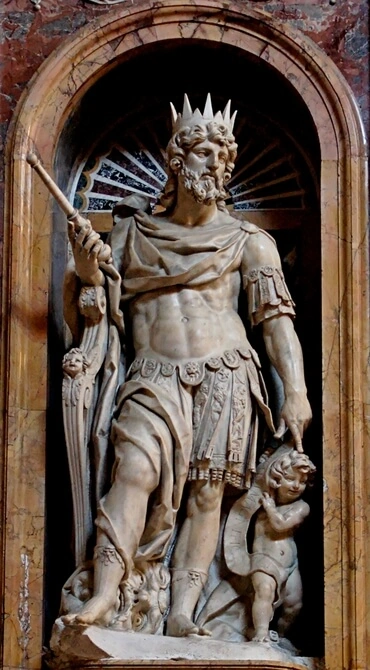1
Und das Wort Jehovas geschah zu mir also:
2
Menschensohn, weissage wider die Hirten Israels, weissage und sprich zu ihnen, den Hirten: So spricht der Herr, Jehova: Wehe den Hirten Israels, die sich selbst weiden! (Eig. weideten) Sollen die Hirten nicht die Herde (Eig. das Kleinvieh; dasselbe Wort wie "Schafe" (v 6); so auch v 3. 17. 31) weiden?
3
Ihr esset das Fett und kleidet euch mit der Wolle, das fette Vieh schlachtet ihr; die Herde weidet ihr nicht.
4
Die Schwachen habt ihr nicht gestärkt und das Kranke nicht geheilt und das Verwundete nicht verbunden, und das Versprengte führtet ihr nicht zurück, und das Verlorene suchtet ihr nicht; und mit Strenge habt ihr über sie geherrscht und mit Härte.
5
Und so wurden sie zerstreut, weil sie ohne Hirten waren; und sie wurden allen Tieren des Feldes zur Speise, und wurden zerstreut.
6
Meine Schafe irren umher auf allen Bergen und auf jedem hohen Hügel; und über das ganze Land hin sind meine Schafe zerstreut worden, und da ist niemand, der nach ihnen fragt, und niemand, der sie sucht. -
7
Darum, ihr Hirten, höret das Wort Jehovas!
8
So wahr ich lebe, spricht der Herr, Jehova: Weil meine Schafe zur Beute und meine Schafe allen Tieren des Feldes zur Speise geworden sind, weil kein Hirte da ist, und meine Hirten nicht nach meinen Schafen fragen, und die Hirten sich selbst weiden, aber nicht meine Schafe weiden:
9
darum, ihr Hirten, höret das Wort Jehovas!
10
So spricht der Herr, Jehova: Siehe, ich will an die Hirten, und ich werde meine Schafe von ihrer Hand fordern und machen, daß sie aufhören, die Schafe zu weiden, damit die Hirten nicht mehr sich selbst weiden; und ich werde meine Schafe von ihrem Munde erretten, daß sie ihnen nicht mehr zur Speise seien.
11
Denn so spricht der Herr, Jehova: Siehe, ich bin da, und ich will nach meinen Schafen fragen und mich ihrer annehmen.
12
Wie ein Hirt sich seiner Herde annimmt an dem Tage, da er unter seinen zerstreuten Schafen ist, also werde ich mich meiner Schafe annehmen und werde sie erretten aus allen Orten, wohin sie zerstreut worden sind am Tage des Gewölks und des Wolkendunkels.
13
Und ich werde sie herausführen aus den Völkern und sie aus den Ländern sammeln und sie in ihr Land bringen; und ich werde sie weiden auf den Bergen Israels, in den Tälern und an allen Wohnplätzen des Landes.
14
Auf guter Weide werde ich sie weiden, und auf den hohen Bergen Israels wird ihre Trift sein; daselbst, auf den Bergen Israels, werden sie auf guter Trift lagern und fette Weide beweiden.
15
Ich will meine Schafe weiden, und ich will sie lagern, spricht der Herr, Jehova.
16
Das Verlorene will ich suchen und das Versprengte zurückführen, und das Verwundete will ich verbinden, und das Kranke will ich stärken; das Fette aber und das Starke werde ich vertilgen: nach
echt werde ich sie weiden. -
17
Und ihr, meine Herde, so spricht der Herr, Jehova: Siehe, ich werde richten zwischen Schaf und Schaf, den Widdern und den Böcken.
18
Ist es euch zu wenig, daß ihr die gute Weide abweidet und das Übrige eurer Weide mit euren Füßen zertretet, und daß ihr das abgeklärte Wasser trinket und das Übriggebliebene mit euren Füßen trübet?
19
Und meine Schafe sollen abweiden, was mit euren Füßen zertreten, und trinken, was mit euren Füßen getrübt ist?
20
Darum, so spricht der Herr, Jehova, zu ihnen: Siehe, ich bin da, und ich werde richten zwischen fettem Schaf und magerem Schaf.
21
Weil ihr all die Schwachen mit Seite und Schulter verdränget und mit euren Hörnern stoßet, bis ihr sie nach außen hin zerstreut habt,
22
so will ich meine Schafe retten, damit sie nicht mehr zur Beute seien; und ich werde richten zwischen Schaf und Schaf.
23
Und ich werde einen Hirten über sie erwecken, und er wird sie weiden-meinen Knecht David: der wird sie weiden, und der wird ihr Hirt (Eig. ihnen zum Hirten (zum Gott)) sein.
24
Und ich, Jehova, werde ihr Gott (Eig. ihnen zum Hirten (zum Gott)) sein, und mein Knecht David wird Fürst sein in ihrer Mitte. Ich, Jehova, habe geredet.
25
Und ich werde einen Bund des Friedens mit ihnen machen, und werde die bösen Tiere aus dem Lande vertilgen; und sie werden in der Wüste sicher wohnen und in den Wäldern schlafen.
26
Und ich werde sie und die Umgebungen meines Hügels zum Segen machen; und ich werde den
egen fallen lassen zu seiner Zeit,
egen des Segens werden es sein.
27
Und der Baum des Feldes wird seine Frucht geben, und das Land wird seinen Ertrag geben; und sie werden in ihrem Lande sicher sein. Und sie werden wissen, daß ich Jehova bin, wenn ich die Stäbe ihres Joches zerbreche und sie aus der Hand derer errette, welche sie knechteten.
28
Und sie werden nicht mehr den Nationen zur Beute sein, und die wilden Tiere der Erde werden sie nicht mehr fressen; sondern sie werden in Sicherheit wohnen, und niemand wird sie aufschrecken.
29
Und ich werde ihnen eine Pflanzung erwecken zum
uhme (Eig. zum Namen,) und sie werden nicht mehr durch Hunger weggerafft werden im Lande und nicht mehr die Schmach der Nationen tragen.
30
Und sie werden wissen, daß ich, Jehova, ihr Gott, mit ihnen bin, und daß sie, das Haus Israel, mein Volk sind, spricht der Herr, Jehova.
31
Und ihr, meine Herde, Herde meiner Weide, ihr seid Menschen; ich bin euer Gott, spricht der Herr, Jehova.







